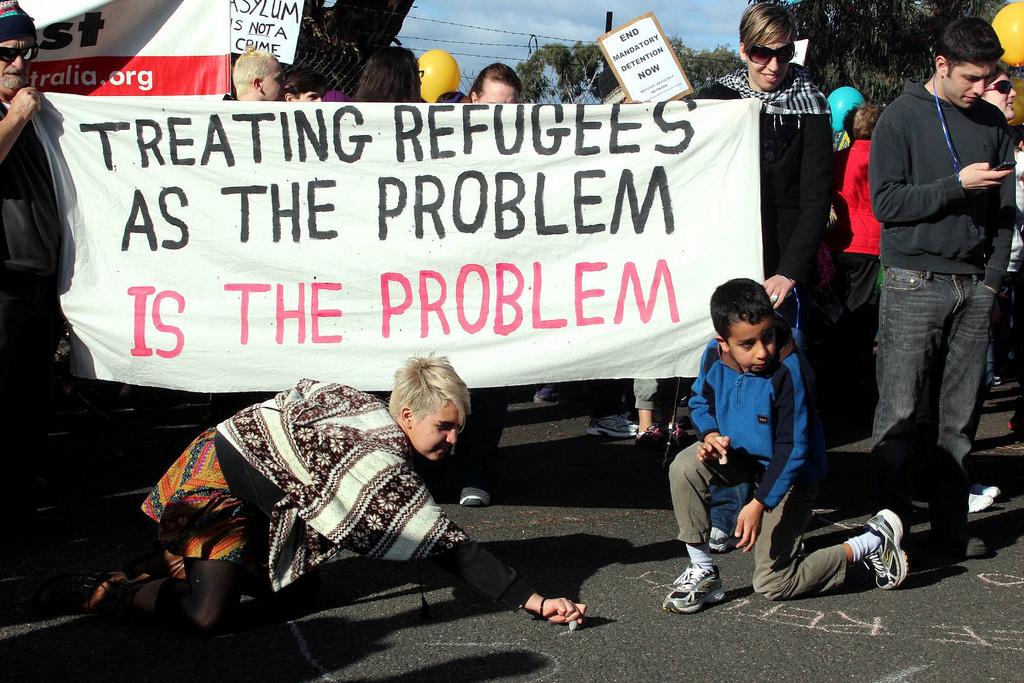 (Credit: Takver, Flickr Creative Commons)
(Credit: Takver, Flickr Creative Commons)
According to Wikipedia, there are…a lot of Bible translations.
I’ll be honest. I lost count. But if the exact number matters to you, you can click here to count them yourself.
Suffice it to say, there are a lot of Bible translations – and I’m just talking about the English language versions. You know, the KJV, the NIV, the NRSV, that sort of thing.
To that list, we can now add at least one new version of the Bible.
The Alternative Bible™.
This is a very special version of the Bible. You can’t buy it in stores yet, at least not under that name, but it is in prolific use these days, especially online and particularly when it comes to caring for the least of these among us and those across the sea.
Citations of this version of the Bible are often missing or so contorted they’re hard to spot, but The Alternative Bible™ typically appears in the form of non-sequiturs, false equivalents, links to websites and YouTube videos with a clear bent towards a particular political party, and, of course, a host of alternative facts that together are used to construct an impenetrable defensive fortification which protects the self-professed Christian from having to accept some of the more challenging aspects of living like Christ.
Don’t know what I’m talking about?
Look no further than the recent controversy over Jesus’ status as a refugee. Luke 2 makes it abundantly clear that Jesus was a textbook refugee who fled to Egypt with his family to escape Herod’s persecution and yet that hasn’t stopped some Christians from ignoring the passage altogether, rewriting it as a story about taxes, or tempering his journey to Egypt as nothing more than the fulfillment of an ancient prophecy.
Or here’s another great example of one passage often citied from The Alternative Bible. You’ll notice it looks exactly like any other translation, except for that bit at the end.
Then the King will say to those on his right, ‘Come, you who are blessed by my Father; take your inheritance, the kingdom prepared for you since the creation of the world. For I was hungry and you gave me something to eat, I was thirsty and you gave me something to drink, I was a stranger and you invited me in, I needed clothes and you clothed me, I was sick and you looked after me, I was in prison and you came to visit me.’
Then the righteous will answer him, ‘Lord, when did we see you hungry and feed you, or thirsty and give you something to drink? When did we see you a stranger and invite you in, or needing clothes and clothe you? When did we see you sick or in prison and go to visit you?’
The King will reply, ‘Truly I tell you, whatever you did for one of the least of these brothers and sisters of mine, you did for me.’”*
*Unless doing so made you feel unsafe or uncomfortable or if the people who needed help had a different skin color, practiced a different faith, or spoke a different language, in which case you are excused.
Sure, this is the one passage in all of the gospels in which Jesus describes exactly how he will make his heaven or hell decision and Jesus makes it unequivocally clear that his decision will be determined not on a confession of faith, but caring for the least of these, but who cares? We live in an age of alternative facts, might as well have an Alternative Bible™ to match!
Sadly, this sort of contortion is nothing new. Too much of American Christianity has been excusing itself from all sorts of ongoing social justice work for a long time now, at least since the myth was born which declares that justice, the term “social justice” in particular, is a foreigner to the gospel, added sometime in the late 20th century by godless liberals.
Hashtag: Thanks, Fox News.
Jesus may have said, “Blessed are the poor” and made their care both central to his good news and a matter of heaven or hell, but in many Christian circles the least of these are stigmatized as lazy, good for nothing, dangerous dregs on society. Poor people are fine when they’re passing through the line at a soup kitchen and refugees are ok when they’re a shoebox’s length away on the other side of the world, but work to create systemic change that could have a lasting impact on their lives? Absolutely not!
Which brings us back to The Alternative Bible™.
Along with a slightly different rendering of Matthew 25, The Alternative Bible™ also comes with an important additional verse: “Moderation in all things.”
You won’t find it in any other version of the Bible – those would be the words of Ralph Waldo Emerson, not Jesus or Paul – but the sentiment has been sanctified as holy scripture, not simply because it sounds Christian-ish, but because it offers a great out – or alternative – for not having to sacrifice too much or speak too loudly or stand up too strongly for others when doing so makes us too uncomfortable or strains the bonds of the faux-unity we idolize so much.
It’s not an explicit argument, mind you, more of an ethos. The idea is that moderation in all things is a Christian virtue because moderation means temperance and good manners and just being nice to people and if Jesus was nothing else, he was a calm, well-mannered young man who never spoke ill of anyone, least of all his fellow believers.
Sure, nothing could be further from the truth – Jesus was an apocalyptic prophet who denounced the religious leadership with colorful language, had no qualms about flipping over tables in holy places, and was such a religious/political threat it got him crucified – but we live in the Alternative Age. Truth is whatever you want it to be.
Now, to be fair, the moderation-in-all-things-is-a-Christian-virtue idea may come from the archaic language of the King James Version of Philippians 4:5 and 1 Corinthians 9:25. However, as a more modern (and accurate) translation like the New Revised Standard Version handles the Greek, the passage in Philippians is referring to “reasonableness” while in 1 Corinthians, Paul is talking about “self-control.”
Reasonableness and self-control are certainly worth having, no doubt about that. The problem arises when those sorts of virtues are used to prop up systems of oppression and marginalization and silence those who would speak out. That is to say, those virtues become vices when the cry for temperance in the name of Jesus is used to shame fellow Christians for holding their brothers and sisters publicly accountable to the gospel they profess to believe in.
Moderation may have its place, but if we convince ourselves there are no areas in life in which we should be “extreme,” we miss the radical nature of the gospel. For despite his typically meek, soft-spoken portrayal in modern cinema, Jesus made bold, often divisive claims, and took defiant stands in the face of injustice.
Which should come as no surprise to anyone who has read through the prophets of the Hebrew Bible. Though, of our course, there in lies a tragic irony. For, we love to call attention to how Jesus fulfills the messianic words of the prophets, yet we conspicuously ignore the greatest, most repeated, and foundational prophecy found throughout the Hebrew Bible: the call to seek justice, defend the oppressed, take up the cause of the fatherless, and plead the case of the widow.
The call to justice was a central message for his prophetic forerunners, and it was foundational to the gospel of Jesus. As the fulfillment of messianic prophecy, Jesus wasn’t just saving souls, he making all things new by restoring justice, liberating the oppressed, and setting the captive free. That good news is fundamental to the good news, which is why Jesus said “go and do likewise,” not “go and think likewise.”
We simply can’t afford to be moderate when it comes to justice because not only are lives are on the line – so are our souls.
Likewise, we can’t afford to be moderate in love or grace or forgiveness either, because those things are at the very heart of God’s nature and to be like Christ means to take on that part of his nature and that part of God’s nature knows no limits.
While most Christians – conservative, liberal, or otherwise – can get on board with the boundless love, grace, and forgiveness train, for some reason when it comes to justice, we’re less “let justice roll on like a river” and more, “Calm down and be patient. I agree with you in the goal you seek, but I cannot agree with your methods of direct action.”
Perhaps, the struggle lies in the cost.
Extending love and grace is a fairly easy thing to do, at least most of the time, and typically it doesn’t come with great personal cost (unless of course we’re loving the “wrong” people). Forgiveness can certainly be more challenging at times, but it is generally an internal affair apart from whatever words may be spoken to the one at fault.
But justice requires us to stand up and stand between the oppressor and the oppressed because “Human progress never rolls in on wheels of inevitability; it comes through the tireless efforts of men willing to be co workers with God, and without this hard work, time itself becomes an ally of the forces of social stagnation.”
Standing up and speaking out for justice requires courage in the face of fear, a willingness to put our safety on the line, and a resolute spirit the pushes us out of our comfort zone in order to disrupt the status quo in ways our family and friends may not approve of. Moreover, standing up and speaking out for justice can sometimes force us to confront the reality that we were part of the problem all along, albeit in passive, complicit ways we were too blind to see. Maybe that’s why it makes us so uncomfortable.
But comfortable or not, in the life of a Christian, passion for justice should rush forth like a mighty torrent bursting through a dam. If it doesn’t, we should examine ourselves honestly and question whether or not it is Jesus we follow or whether it is civil religion that has become our God; for civil religion venerates moderation and its ability to keep the masses obedient and the powerful in power. But for Christ, the good news is a radically incarnated proclamation that upsets the established order with its declaration that the poor are blessed, the last are first, the weak are strong, and all things are being made new.
Put simply, there is no middle ground when it comes to justice, no space between for Christians to occupy in order to bridge the gap between oppressor and oppressed. The Christian, like Christ himself, must always stand firmly and defiantly on the side of the oppressed until they are oppressed no more or Christ has returned to set them free.
Even Emerson recognized the problem with moderation in all things. His entire quote is this, “Moderation in all things, especially moderation.”
There is a time and place in the Christian life for moderation, moments when a tempered response is called for and bridges need to built, but this is not one of those moments, not when so many desperate lives are hanging in the balance.
As Christians we have an unqualified call to care for the least of these whenever and wherever. If we abandon that call, regardless of the reason why, we cease to be followers of Jesus because in doing so we have chosen to walk down a different, wider path.
We may not be able to end the refugee crisis ourselves and the poor will certainly always be with us, but that is not an excuse for inaction and it is certainly not a justification for temperance in a time of injustice.
Christ’s call to care for the least of these remains, no matter the circumstances.
So, instead of resharing another video of a pastor with an obscenely obvious political party allegiance explaining away Jesus’ refugee status or reposting a meme that justifies exclusion on the basis of comparisons that have nothing to do with each other, I urge you to heed the words of Dietrich Bonhoeffer, a man who lived in a time of unimaginable injustice under the regime of tyrants who silenced – and murdered – anyone who dared to speak out against them.
Hear his words and remember they come not just from a pastor, but from a pastor who embodied the call of Christ even to the point of death because he understood that there is no place for moderation in the pursuit of justice.
“We are not to simply bandage the wounds of victims beneath the wheels of injustice, we are to drive a spoke into the wheel itself.”
And as those words resonate through your imagination, remember too the words of Jesus.
Go.
And do likewise.












